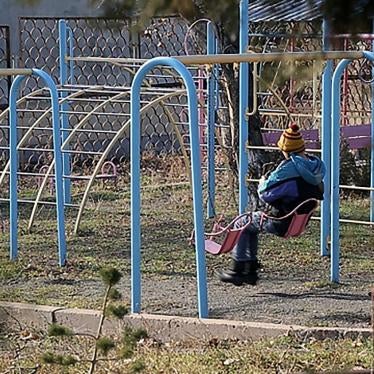We write in advance of the 81st pre-session of the Committee on the Elimination of Discrimination against Women and its adoption of a list of issues prior to reporting regarding Armenia’s compliance with the Convention on the Elimination of All Forms of Discrimination against Women. This submission includes information on gender-based violence against women, access to education during the Covid-19 pandemic, and protection of education from attack during armed conflict.
Violence Against Women (Articles 1 and 2)[1]
In December 2017, Armenia’s parliament passed a law on violence in the family, putting in place a legal framework to address violence against women.[2] However women and girls remain at risk until the government comprehensively changes how police respond to complaints of domestic violence and provides accessible, quality services for survivors.
In 2017 Human Rights Watch spoke with 12 survivors of severe domestic abuse in Armenia. The women said their husbands or male partners punched and kicked them, raped them, struck them with furniture and other objects, confined them in their homes, stalked them, and threatened or attempted to kill them with knives or other sharp objects. Five women said the attacks against them continued during pregnancy; three said they had miscarriages after their husbands beat them.[3]
Those interviewed said that when they reported abuse to police or other authorities, the authorities did nothing to prevent further violence, investigate cases, or hold the attackers accountable. In some cases, the authorities encouraged women to drop complaints and reconcile with their abusers. The authorities did not refer the women for services or assistance.
The 2017 family violence law requires police to urgently intervene “when there is a reasonable assumption of an immediate threat of repetition or the continuation of violence” in the family. But in practice, law enforcement bodies lack awareness and training on protection mechanisms envisaged by the law, such as protection orders, and do not adequately use them.
According to official data, during 2020, authorities investigated 730 criminal domestic violence complaints. Of the 730, charges were brought in 345 cases and in 200 of those the husband was identified as the alleged perpetrator. 144 cases went forward to trial.[4]
Lack of Legal Remedies
Armenian law does not effectively protect survivors of domestic violence. The law defines domestic violence as “a physical, sexual, psychological, or economic act of violence” between family members, including spouses in unregistered marriages. It is not clear if the law applies to couples who are not in either registered or unregistered marriages.
Just before submitting the law on violence in the family to parliament in mid-November 2017, the government revised the law to include “strengthening of traditional values in the family” as a key principle. Authorities also changed the title to add the concept of “restoring harmony in the family.”
The Coalition to Stop Violence against Women, a union of local women’s rights groups, expressed concerns that the new law’s principle of “traditional values” could be used to reinforce obsolete and problematic gender roles and stereotypes. Activists also fear an emphasis on “restoring harmony” could be used to pressure women to remain in abusive relationships. In addition, domestic violence is neither a stand-alone felony nor an aggravating criminal circumstance in the Criminal code.[5]
The government signed the Council of Europe Convention on Preventing and Combating Violence against Women and Domestic Violence (Istanbul Convention) in 2018, but the ratification process has stalled amidst a campaign by some government officials that promoted blatant falsehoods about the convention.[6]
Inadequate shelter, rehabilitation and support services.
Many women said they lived with their abusers for years because they had no means of escape. The country has only two domestic violence shelters, both in the capital, Yerevan, run by nongovernmental organizations, each with a capacity for five women and their children. Council of Europe standards call for at least one specialized shelter in every region, and one shelter space per 10,000 people. With a population of approximately 2.9 million, Armenia should have approximately 290 shelter spaces. The new law mandates creating government-run shelters, but does not specify the number of shelters or their capacity. Armenia also lacks a general hot-line service for survivors of domestic violence.[7]
Human Rights Watch recommends that the Committee ask the government:
- What is being done to ensure the prompt, thorough, and impartial investigation of all domestic violence cases, using methods that mitigate risks for survivors, and prosecute and punish the attackers?
- What is being done to train all law enforcement agents and the judiciary about the 2017 family violence law, and what measures are in place to monitor its enforcement and impact?
- What steps are being taken to ensure immediate access to protection for survivors of domestic abuse through increasing the availability of shelter spaces, including in rural areas, and the issuing of short- and long-term protection orders?
- What comprehensive and quality medical, psychological, legal and other services are available for survivors and their children?
- What steps are being taken to educate the public about the new law, how to file complaints, and the availability of services?
- What steps are being taken to ensure that domestic violence is a standalone criminal offense, which would help to ensure an optimal response, particularly in cases of abusive patterns of behavior in which individual acts of violence do not reach the criminal threshold? Are there plans to amend the law or the criminal code to create a stand-alone criminal offense of domestic violence?
- What steps are being taken towards ratification of the Istanbul Convention? What are the existing barriers to ratification that the government has identified, if any, and how does the government plan to address these in order to complete the ratification process?
Access to Education during Covid-19 Pandemic (Article 10)
In the last year, Human Rights Watch has documented how pandemic-related school closures have affected children unequally around the globe, as not all children had the opportunities, tools, or access needed to continue learning during the pandemic. We interviewed more than 470 students, parents, and teachers in 60 countries, including 18 in Armenia.[8] The report we published paid particular attention to the experiences of women and girls, including the ways in which inequity limited girls’ access to online learning and remote education and how the burden of ensuring that children could learn remotely fell disproportionately on women.
Teachers and Students Without Reliable Internet or Devices
For teachers and students living in areas with poor connectivity, unreliable internet services significantly damaged their ability to teach or learn online. Further, in what constitutes a double barrier to meaningful internet access, those living in the least connected places contend with the slowest internet in the world, at the least affordable prices. Also, some children had limited access to any kind of device that would enable learning or allow them to stay in touch with their teachers. Girls are less likely than boys to have access to devices, and smartphone ownership is 20 per cent lower among women than men.[9]
Human Rights Watch recommends that the Committee ask the government of Armenia:
- How does the government plan to remedy learning time lost by children due to Covid-19 related school closures, in particular for girls?
- What strategies are being adopted to mitigate the impacts of in-person school closures on children’s learning, particularly for girls, and the disproportionate impact of increased child-care and teaching responsibilities on women at home? For example, is the government working with teachers, school officials, and teachers’ unions and associations, and local education and parent committees, to recover teaching or contact hours lost and, where necessary, adjusting school calendars and exam schedules, and ensuring fair compensation for teachers and school personnel working additional hours? What steps are being taken to support female teachers who had to teach from home while their own children also had to study at home?
- What measures are being adopted to provide affordable, reliable, quality, and accessible internet, including targeted measures to provide free, equitable access to the internet for educational content, and capable devices for every student?
- What steps are being taken to develop or expand device affordability and availability initiatives for schools and families, with support targeted for girls and those living in rural areas?
Protection of Education from Attack (Article 10)
During military hostilities in and around Nagorno-Karabakh from September to November 2020, more than 150 civilians were killed, according to government and non-governmental reports. Human Rights Watch investigated whether the armed forces were following their obligations under international humanitarian law, and documented multiple violations by both sides.[10] We also examined the consequences of the conflict for school children.
According to official data, at least 71 schools on the Armenian side, including 2 in the Republic of Armenia, and 54 Azerbaijani schools were damaged or destroyed. Dozens of other establishments that helped children flourish and fueled their personal development and growth were also damaged or destroyed, including kindergartens, arts schools and sports schools, and vocational schools.
Schools on both sides had closed in March 2020 due to the Covid-19 pandemic, and had just reopened in mid-September. They closed again after the fighting began on September 27. Many schools were repurposed as shelters for the displaced. On the Armenian side, some schools were also used as military hospitals and barracks. Some were looted by local residents and military forces.
As recognized by this Committee in its General Recommendation No. 30, attacks on students and schools, and the use of schools for military purposes, disproportionately affect girls, who are sometimes the focus of targeted attacks and are more likely to be kept out of school due to security concerns.[11]
The Safe Schools Declaration is an inter-governmental political commitment that provides countries the opportunity to express political support for the protection of students, teachers, and schools during times of armed conflict;[12] the importance of the continuation of education during armed conflict; and the implementation of the Guidelines for Protecting Schools and Universities from Military Use during Armed Conflict.[13] Armenia endorsed the Safe Schools Declaration in March 2017, contributing to global efforts to protect education and improve compliance with international law.
Human Rights Watch recommends that the Committee ask the government:
- What steps has Armenia taken to implement the commitments in the Safe Schools Declaration?
- Are explicit protections for schools or universities from military use included in any policies, rules, or trainings for Armenia’s armed forces?
- What steps are being taken to examine and address and, as relevant, remedy any disproportionate harm to girls’ access to education as a result of hostilities and military use of schools?
[1] See also CEDAW, Gen. Recommendations No. 19 and 35.
[2] “The Law on Prevention of Violence in the Family, Protection of Victims of Violence in the Family, and Restoration of Peace in the Family,” https://www.refworld.org/pdfid/5a6b2e274.pdf (accessed June 17, 2021).
[3] “Armenia: Little Protection, Aid for Domestic Violence Survivors: New Law Should Enhance Safety, Services, Justice,” Human Rights Watch news release, January 12, 2018, https://www.hrw.org/news/2018/01/12/armenia-little-protection-aid-domestic-violence-survivors
[4] Investigative Committee of the Republic of Armenia, “Information on the Results of the Investigation of Domestic Violence Cases in the Proceedings of the RA Investigation Committee in 2020.” February 19, 2021, https://www.investigative.am/news/view/2020yntanekan-brnutyan-veraberyal0.html (accessed June 9, 2021)
[5] Anahit Chilingaryan, “Countering Domestic Violence Myths in Armenia: European Rights Body Issues Key Opinion, “commentary, Human Rights Watch dispatch, October 24, 2019, https://www.hrw.org/news/2019/10/24/countering-domestic-violence-myths-armenia
[6] https://www.hrw.org/news/2019/10/24/countering-domestic-violence-myths-armenia
[7] “Armenia: Little Protection, Aid for Domestic Violence Survivors: New Law Should Enhance Safety, Services, Justice,” Human Rights Watch news release, January 12, 2018, https://www.hrw.org/news/2018/01/12/armenia-little-protection-aid-domestic-violence-survivors
[8] Human Rights Watch, ““Years Don’t Wait for Them” Increased Inequalities in Children’s Right to Education Due to the Covid-19 Pandemic,” New York: Human Rights Watch, May 2021, https://www.hrw.org/sites/default/files/media_2021/05/global_covideducation0521_web.pdf
[9] 1 Oliver Rowntree et al., “Connected Women: The Mobile Gender Gap Report 2020,” GSMA report, May 2020,
https://www.gsma.com/mobilefordevelopment/wp-content/uploads/2020/05/GSMA-The-Mobile-Gender-Gap-Report2020.pdf (accessed April 2, 2021).
[12] Safe Schools Declaration, May 28, 2015, https://www.regjeringen.no/globalassets/departementene/ud/vedlegg/utvikling/safe_schools_declaration.pdf (accessed January 23, 2020).
[13] Guidelines for Protecting Schools and Universities from Military Use during Armed Conflict, March 18, 2014, http://protectingeducation.org/sites/default/files/documents/guidelines_en.pdf (accessed January 23, 2020).






